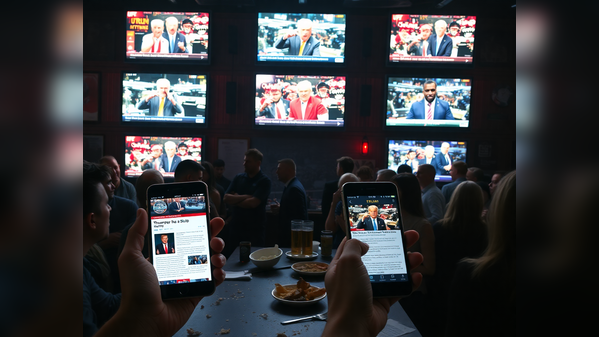The Don' shows Trump has won the American culture wars

19-Nov-2024 08:54 PM
When Jon Jones busted out Donald Trump’s signature dance after his UFC victory, it wasn’t just a viral moment—it was a symbol of something bigger. Trump has morphed from political figure to pop-culture icon, seamlessly crossing over into sports, podcasts, and beyond. In 2024, his influence isn’t just about votes; it’s about the cultural Kulturkampf reshaping America, where Trump isn’t merely a candidate—he’s the cultural force everyone’s dancing to.
The Pop Culture Pivot Last week, in a packed Madison Square Garden, the UFC ’s Jon Jones celebrated his victory by mimicking Donald Trump ’s now-iconic celebratory dance—a brisk side shuffle punctuated with finger guns. The moment, captured on camera and swiftly shared across social media, epitomized Trump’s peculiar but undeniable influence on American culture. What began as a rally quirk has morphed into a viral trend spanning sports, college fraternities, and even TikTok. This is not the first time Trump’s personality has spilled beyond politics. Since his debut on the national stage, Trump has understood the power of theatrics and self-branding. From WWE appearances to his own reality show, he has always been more than a politician—he’s a showman. But in 2024, Trump’s second act as president isn’t just about the politics of conservatism. It’s about its aesthetics. The transformation of Trump into a cultural phenomenon is particularly striking because it runs counter to expectations of how political figures behave. In an era when most leaders carefully curate their image, Trump leans into being both brash and meme-worthy, cementing his appeal among audiences far removed from the traditional Republican base. The Bros Who Built MAGA 2.0 To understand Trump’s sweeping victory, one must delve into the “bro-ification” of the MAGA movement . Joe Rogan, Tucker Carlson , and Charlie Kirk—the triumvirate of male podcasting—have created a digital ecosystem where politics, pop culture, and bro banter seamlessly intertwine. Together, they amplified Trump’s message to millions of young men across the country, framing his presidency not as an aberration but as a cultural inevitability. Rogan, the stoner bro; Carlson, the preppy debate bro; and Musk, the tech bro, are part of an eclectic roster of Trump surrogates that also includes finance moguls, NFL stars, and even nostalgic entertainers like Hulk Hogan. Each of these figures brings their own fanbase, offering Trump a broad, multifaceted cultural legitimacy that transcends the traditional trappings of political support. It’s a far cry from 2016 when Trump’s coalition felt like a misfit rebellion against the establishment. By 2024, it has evolved into something closer to a fraternity of success and swagger, where the lines between policy, masculinity, and meme culture blur. A Kulturkampf Redux This election wasn’t just a political contest; it was a cultural reckoning. Trump’s appeal among young men—particularly Gen Z—has skyrocketed, driven by his overt embrace of traditional masculinity in an age often critical of it. This stands in sharp contrast to Democratic candidate Kamala Harris, whose campaign struggled to resonate with the same demographic. While Democrats have long dominated the culture wars through Hollywood, academia, and coastal liberalism, Trump’s victory signals a seismic shift. The Republican Party, traditionally seen as stodgy and outdated, now champions a brash, unapologetic version of Americana that feels deeply relevant to a younger, more digitally native audience. Podcasts, viral dances, and even frat-house endorsements have all played a role in this transformation. The Democrats, meanwhile, appear to have underestimated the power of cultural relatability. Harris’s campaign focused on issues like climate change and wealth taxes—important, yes, but abstract and distant to many voters compared to Trump’s visceral “us versus them” rhetoric. Trump’s Global Echoes Abroad, Trump’s reelection has been met with muted resignation rather than outrage. In 2016, his unexpected victory sparked global protests and the #Resistance movement. In 2024, however, the mood is more subdued. With the European right already in ascendance and Trump’s presidency less of a novelty, many leaders have shifted from outrage to pragmatism. This time, Trump didn’t just win the Electoral College; he’s on track to capture the popular vote, solidifying his legitimacy in a way that eluded him in his first term. For his opponents, this development is both sobering and deflating. As one European diplomat put it, “We’ve learned to work with him, for better or worse.” For America’s allies, the next four years promise significant challenges, particularly regarding trade and military aid. Trump’s vow to impose sweeping tariffs and reduce support for Ukraine has already sent ripples through European capitals, where leaders are scrambling to unify in response. The Era of Trump, Defined Trump’s second presidency isn’t just a political victory; it’s a cultural triumph. From UFC arenas to top-ranking podcasts, his influence is palpable and growing. Platforms like The Joe Rogan Experience and Tucker Carlson Today have become cultural megaphones for his ideas, amplifying his reach far beyond traditional political channels. He has rewritten the rules of engagement—not just in politics but in the broader cultural conversation. In 2016, Trump’s critics dismissed his victory as a fluke. In 2024, it’s clear: this is no anomaly. Trump has reshaped not just the Republican Party but the very fabric of American life. And as Jon Jones shuffles to his next fight, finger guns blazing, it’s a reminder that Trump’s impact extends far beyond the White House—it’s in the rhythm of the nation itself.